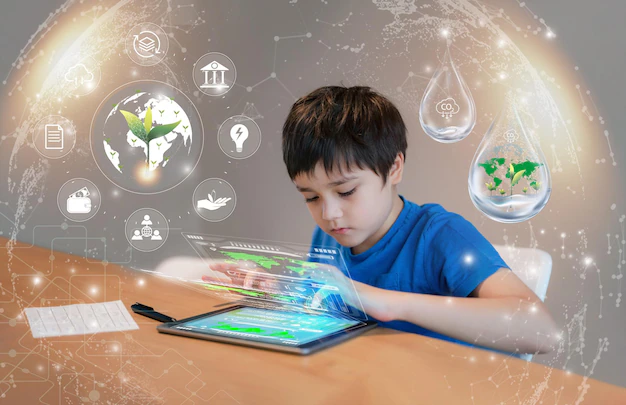Imagine wearing a virtual reality headset to study ancient civilizations or having a specialized AI teacher walk you through challenging subjects. Buckle up as we explore 10 EdTech innovations that are not only altering classrooms but also opening a new frontier in the field of knowledge. Are you ready to go on this fascinating adventure? Let’s plunge in!
10 EdTech new Innovations Reshaping the Classroom Experience
These game-changing tools are transforming the way students learn, teachers teach, and education is delivered, fostering a more engaging, personalized, and effective learning environment. Let’s delve into 10 of these transformative innovations:
- Virtual Reality (VR) and Augmented Reality (AR):
- VR immerses students in simulated environments, fostering deeper understanding and engagement with complex concepts across various subjects.
- AR overlays digital elements onto the real world, enhancing visualization, collaboration, and hands-on learning.
- Gamification:
- Educational games make learning fun and interactive, motivating students to tackle challenging concepts with enthusiasm.
- Gamification elements like points, badges, and leaderboards encourage healthy competition and boost knowledge retention.
- Artificial Intelligence (AI):
- AI-powered tutors provide personalized instruction and feedback, catering to individual learning styles and needs.
- AI can analyze student data to identify areas for improvement and guide teachers in providing effective interventions.
- Adaptive Learning Platforms:
- These platforms tailor content and instruction to each student’s progress and abilities, ensuring they are neither overchallenged nor underwhelmed.
- Adaptive learning empowers students to learn at their own pace and master concepts efficiently.
- Collaborative Learning Tools:
- Online platforms and digital spaces enable students to work together remotely, fostering teamwork, communication, and problem-solving skills.
- Collaboration tools enhance peer learning, build social connections, and prepare students for real-world collaborative scenarios.
- Cloud-Based Learning Systems:
- Cloud access makes educational resources readily available anywhere, anytime, on any device.
- This accessibility promotes flexible learning, supports remote students, and enables continuous learning beyond the classroom walls.
- Big Data Analytics for Education:
- Analyzing student data through big data tools helps educators gain valuable insights into learning patterns, identify struggling students, and tailor interventions accordingly.
- Data-driven education improves learning outcomes and leads to more effective pedagogical strategies.
- Open Educational Resources (OERs):
- Freely available, high-quality learning materials democratize access to education and broaden curriculum possibilities.
- OERs empower educators to curate personalized learning experiences and reduce textbook costs for students.
- The Internet of Things (IoT) in Education:
- Connecting physical objects to the internet creates learning opportunities that are interactive, data-driven, and relevant to real-world applications.
- IoT can foster deeper understanding of STEM concepts and prepare students for future careers in technology-driven fields.
- Blended Learning and Flipped Classrooms:
- Merging online and offline learning allows students to explore concepts individually at their own pace, using digital resources, and then engage in collaborative activities and in-depth discussions in the classroom.
- This flipped approach promotes active learning, critical thinking, and deeper understanding.
What is the importance of education in edtech ?
EdTech innovations are crucial for several reasons:
- Meeting the diverse needs of learners: Traditional one-size-fits-all education is often inadequate. EdTech provides personalized learning experiences tailored to individual styles and abilities.
- Engaging students: Interactive and immersive technologies stimulate student interest and make learning more enjoyable, leading to better outcomes.
- Developing 21st-century skills: EdTech promotes essential skills like critical thinking, collaboration, problem-solving, and digital literacy, preparing students for success in the modern world.
- Enhancing teaching effectiveness: Teachers can leverage technology to differentiate instruction, provide immediate feedback, and analyze student data to inform their practices.
- Promoting accessibility: EdTech tools can bridge the gap for students with disabilities and those in remote locations, ensuring an equitable and inclusive learning environment.
Required Skills for Educators and Learners:
- Technological fluency: Being comfortable with using and troubleshooting technology is essential.
- Pedagogical skill: Effectively integrating technology into lesson plans and adapting teaching methods to leverage its benefits is crucial.
- Critical thinking and evaluation: Educators and learners need to be able to critically assess the quality and relevance of EdTech tools.
- Collaboration and communication: Effective communication and teamwork are essential for using technology to facilitate collaborative learning.
- Lifelong learning: The digital landscape is constantly evolving, requiring educators and learners to embrace continuous learning and stay updated on emerging technologies.
10 Essential Skills for Success:
- Adaptability: Ability to adjust to change and embrace new technologies.
- Problem-solving: Identifying challenges, developing solutions, and overcoming obstacles.
- Creativity: Thinking outside the box and generating innovative ideas.Information literacy: Finding, evaluating, and utilizing information effectively.
- Self-directed learning: Taking ownership of one’s learning and managing one’s time effectively.
- Technological literacy: Understanding and using technology for learning and productivity.
- Social-emotional learning: Developing self-awareness, managing emotions, and building positive relationships.
These skills are not just for the classroom; they are the cornerstones of success in all aspects of life. By embracing EdTech and fostering these essential skills, we can prepare our students not only for the jobs of tomorrow but for the challenges and opportunities of a rapidly changing world.
CONCLUSION
In conclusion, the integration of these EdTech innovations and the cultivation of essential skills are pivotal for preparing the workforce of the future. To stay competitive, it is crucial for educators, students, and professionals to embrace these changes actively. Embrace the future of education, equip yourself with the necessary skills, and become a trailblazer in your field. Start your journey today!



